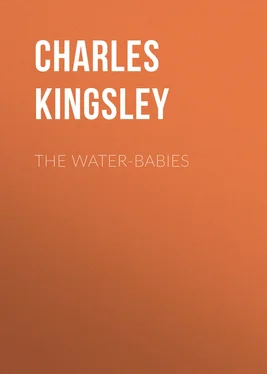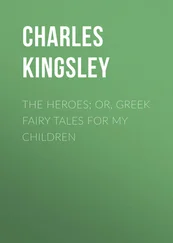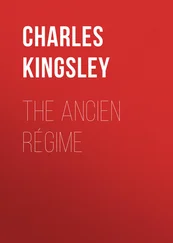Charles Kingsley - The Water-Babies
Здесь есть возможность читать онлайн «Charles Kingsley - The Water-Babies» — ознакомительный отрывок электронной книги совершенно бесплатно, а после прочтения отрывка купить полную версию. В некоторых случаях можно слушать аудио, скачать через торрент в формате fb2 и присутствует краткое содержание. Жанр: Сказка, foreign_antique, foreign_prose, foreign_children, на английском языке. Описание произведения, (предисловие) а так же отзывы посетителей доступны на портале библиотеки ЛибКат.
- Название:The Water-Babies
- Автор:
- Жанр:
- Год:неизвестен
- ISBN:нет данных
- Рейтинг книги:5 / 5. Голосов: 1
-
Избранное:Добавить в избранное
- Отзывы:
-
Ваша оценка:
- 100
- 1
- 2
- 3
- 4
- 5
The Water-Babies: краткое содержание, описание и аннотация
Предлагаем к чтению аннотацию, описание, краткое содержание или предисловие (зависит от того, что написал сам автор книги «The Water-Babies»). Если вы не нашли необходимую информацию о книге — напишите в комментариях, мы постараемся отыскать её.
The Water-Babies — читать онлайн ознакомительный отрывок
Ниже представлен текст книги, разбитый по страницам. Система сохранения места последней прочитанной страницы, позволяет с удобством читать онлайн бесплатно книгу «The Water-Babies», без необходимости каждый раз заново искать на чём Вы остановились. Поставьте закладку, и сможете в любой момент перейти на страницу, на которой закончили чтение.
Интервал:
Закладка:
If he says that things cannot degrade, that is, change downwards into lower forms, ask him, who told him that water-babies were lower than land-babies? But even if they were, does he know about the strange degradation of the common goose-barnacles, which one finds sticking on ships’ bottoms; or the still stranger degradation of some cousins of theirs, of which one hardly likes to talk, so shocking and ugly it is?
And, lastly, if he says (as he most certainly will) that these transformations only take place in the lower animals, and not in the higher, say that that seems to little boys, and to some grown people, a very strange fancy. For if the changes of the lower animals are so wonderful, and so difficult to discover, why should not there be changes in the higher animals far more wonderful, and far more difficult to discover? And may not man, the crown and flower of all things, undergo some change as much more wonderful than all the rest, as the Great Exhibition is more wonderful than a rabbit-burrow? Let him answer that. And if he says (as he will) that not having seen such a change in his experience, he is not bound to believe it, ask him respectfully, where his microscope has been? Does not each of us, in coming into this world, go through a transformation just as wonderful as that of a sea-egg, or a butterfly? and do not reason and analogy, as well as Scripture, tell us that that transformation is not the last? and that, though what we shall be, we know not, yet we are here but as the crawling caterpillar, and shall be hereafter as the perfect fly. The old Greeks, heathens as they were, saw as much as that two thousand years ago; and I care very little for Cousin Cramchild, if he sees even less than they. And so forth, and so forth, till he is quite cross. And then tell him that if there are no water-babies, at least there ought to be; and that, at least, he cannot answer.
And meanwhile, my dear little man, till you know a great deal more about nature than Professor Owen and Professor Huxley put together, don’t tell me about what cannot be, or fancy that anything is too wonderful to be true. “We are fearfully and wonderfully made,” said old David; and so we are; and so is everything around us, down to the very deal table. Yes; much more fearfully and wonderfully made, already, is the table, as it stands now, nothing but a piece of dead deal wood, than if, as foxes say, and geese believe, spirits could make it dance, or talk to you by rapping on it.
Am I in earnest? Oh dear no! Don’t you know that this is a fairy tale, and all fun and pretence; and that you are not to believe one word of it, even if it is true?
But at all events, so it happened to Tom. And, therefore, the keeper, and the groom, and Sir John made a great mistake, and were very unhappy (Sir John at least) without any reason, when they found a black thing in the water, and said it was Tom’s body, and that he had been drowned. They were utterly mistaken. Tom was quite alive; and cleaner, and merrier, than he ever had been. The fairies had washed him, you see, in the swift river, so thoroughly, that not only his dirt, but his whole husk and shell had been washed quite off him, and the pretty little real Tom was washed out of the inside of it, and swam away, as a caddis does when its case of stones and silk is bored through, and away it goes on its back, paddling to the shore, there to split its skin, and fly away as a caperer, on four fawn-coloured wings, with long legs and horns. They are foolish fellows, the caperers, and fly into the candle at night, if you leave the door open. We will hope Tom will be wiser, now he has got safe out of his sooty old shell.
But good Sir John did not understand all this, not being a fellow of the Linnaean Society; and he took it into his head that Tom was drowned. When they looked into the empty pockets of his shell, and found no jewels there, nor money—nothing but three marbles, and a brass button with a string to it—then Sir John did something as like crying as ever he did in his life, and blamed himself more bitterly than he need have done. So he cried, and the groom-boy cried, and the huntsman cried, and the dame cried, and the little girl cried, and the dairymaid cried, and the old nurse cried (for it was somewhat her fault), and my lady cried, for though people have wigs, that is no reason why they should not have hearts; but the keeper did not cry, though he had been so good-natured to Tom the morning before; for he was so dried up with running after poachers, that you could no more get tears out of him than milk out of leather: and Grimes did not cry, for Sir John gave him ten pounds, and he drank it all in a week. Sir John sent, far and wide, to find Tom’s father and mother: but he might have looked till Doomsday for them, for one was dead, and the other was in Botany Bay. And the little girl would not play with her dolls for a whole week, and never forgot poor little Tom. And soon my lady put a pretty little tombstone over Tom’s shell in the little churchyard in Vendale, where the old dalesmen all sleep side by side between the lime-stone crags. And the dame decked it with garlands every Sunday, till she grew so old that she could not stir abroad; then the little children decked it, for her. And always she sang an old old song, as she sat spinning what she called her wedding-dress. The children could not understand it, but they liked it none the less for that; for it was very sweet, and very sad; and that was enough for them. And these are the words of it:-
When all the world is young, lad,
And all the trees are green;
And every goose a swan, lad,
And every lass a queen;
Then hey for boot and horse, lad,
And round the world away;
Young blood must have its course, lad,
And every dog his day.
When all the world is old, lad,
And all the trees are brown;
And all the sport is stale, lad,
And all the wheels run down;
Creep home, and take your place there,
The spent and maimed among:
God grant you find one face there,
You loved when all was young.
Those are the words: but they are only the body of it: the soul of the song was the dear old woman’s sweet face, and sweet voice, and the sweet old air to which she sang; and that, alas! one cannot put on paper. And at last she grew so stiff and lame, that the angels were forced to carry her; and they helped her on with her wedding-dress, and carried her up over Harthover Fells, and a long way beyond that too; and there was a new schoolmistress in Vendale, and we will hope that she was not certificated.
And all the while Tom was swimming about in the river, with a pretty little lace-collar of gills about his neck, as lively as a grig, and as clean as a fresh-run salmon.
Now if you don’t like my story, then go to the schoolroom and learn your multiplication-table, and see if you like that better. Some people, no doubt, would do so. So much the better for us, if not for them. It takes all sorts, they say, to make a world.
CHAPTER III
“He prayeth well who loveth well
Both men and bird and beast;
He prayeth best who loveth best
All things both great and small:
For the dear God who loveth us,
He made and loveth all.”
Tom was now quite amphibious. You do not know what that means? You had better, then, ask the nearest Government pupil-teacher, who may possibly answer you smartly enough, thus -
“Amphibious. Adjective, derived from two Greek words, amphi , a fish, and bios , a beast. An animal supposed by our ignorant ancestors to be compounded of a fish and a beast; which therefore, like the hippopotamus, can’t live on the land, and dies in the water.”
However that may be, Tom was amphibious: and what is better still, he was clean. For the first time in his life, he felt how comfortable it was to have nothing on him but himself. But he only enjoyed it: he did not know it, or think about it; just as you enjoy life and health, and yet never think about being alive and healthy; and may it be long before you have to think about it!
Читать дальшеИнтервал:
Закладка:
Похожие книги на «The Water-Babies»
Представляем Вашему вниманию похожие книги на «The Water-Babies» списком для выбора. Мы отобрали схожую по названию и смыслу литературу в надежде предоставить читателям больше вариантов отыскать новые, интересные, ещё непрочитанные произведения.
Обсуждение, отзывы о книге «The Water-Babies» и просто собственные мнения читателей. Оставьте ваши комментарии, напишите, что Вы думаете о произведении, его смысле или главных героях. Укажите что конкретно понравилось, а что нет, и почему Вы так считаете.












